Intracellular icf - Study guides, Class notes & Summaries
Looking for the best study guides, study notes and summaries about Intracellular icf? On this page you'll find 900 study documents about Intracellular icf.
Page 3 out of 900 results
Sort by
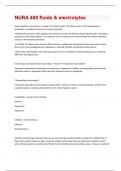
-
NURA 408 fluids & electrolytes Exam Questions With 100% Correct Answers.
- Exam (elaborations) • 19 pages • 2024
- Available in package deal
-
- $8.39
- + learn more
Fluid regulation mechanisms - Answer--The thirst center. The thirst center in the hypothalamus stimulates or inhibits the desire for a person to drink. -Antidiuretic hormone. ADH regulates the amount of water the kidney tubules absorb and is released in response to low blood volume or in response to an increase in the concentration of sodium and other solutes in the intravascular fluids. -The RAAS. The RAA system controls fluid volume, in which when the blood volume decreases, blood flow t...
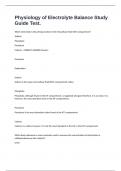
-
Physiology of Electrolyte Balance Study Guide Test.
- Exam (elaborations) • 15 pages • 2024
-
Available in package deal
-
- $14.99
- + learn more
Physiology of Electrolyte Balance Study Guide Test. Which electrolyte is the principal cation in the intracellular fluid (ICF) compartment? Sodium Phosphate Potassium Calcium - CORRECT ANSWER Answer: Potassium Explanation: Sodium Sodium is the major extracellular fluid (ECF) compartment cation. Phosphate Phosphate, although found in the ICF compartment, is negatively charged; therefore, it is an anion. It is, however, the most abundant anion in the ICF compartment. Pota...
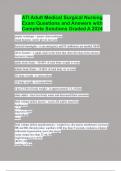
-
ATI Adult Medical Surgical Nursing Exam Questions and Answers with Complete Solutions Graded A 2024
- Exam (elaborations) • 158 pages • 2024
-
- $19.49
- + learn more
aseptic technique - means clean technique -hand hygiene, sterile gloves not used bacterial meningitis - is an emergency and IV antibitoics are needed ASAP stress fracture - a small crack in the bone that often develops from chronic, excessive impact adults body fluids - 50-60% of total body weight is water infants body fluids - 15-80% of total body wt is water 2/3 body weight - is intracellular 1/3 body weight - is extracellular 1 kg (2.2 lb) of body weight - is approximate...
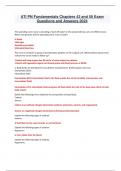
-
ATI PN Fundamentals Chapters 42 and 50 Exam Questions and Answers 2024
- Exam (elaborations) • 28 pages • 2024
-
- $15.49
- + learn more
ATI PN Fundamentals Chapters 42 and 50 Exam Questions and Answers 2024 The operating room nurse is providing a hand-off report to the postanesthesia care unit (PACU) nurse. Which components will the operating room nurse include? IV fluids Vital signs Anesthesia provided Estimated blood loss The nurse is caring for a group of postoperative patients on the surgical unit. Which patient assessments indicate the nurse needs to follow up? -Patient with lung surgery has 20 mL/hr of urine out...
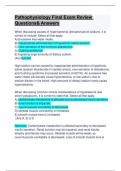
-
Pathophysiology Final Exam Review: Questions& Answers; Updated A Guide Solution
- Exam (elaborations) • 30 pages • 2024
-
- $7.99
- + learn more
When discussing causes of hypernatremia (elevated serum sodium), it is correct to include: Select all that apply. A) Excessive free water intake. B) Inappropriate administration of hypertonic saline solution. C) Over secretion of the hormone aldosterone. D) Cushing syndrome. E) Ingesting large amounts of dietary sodium. (Ans-B,C,&D High sodium can be caused by inappropriate administration of hypertonic saline (sodium bicarbonate in cardiac arrest), over secretion of aldosterone, and Cu...
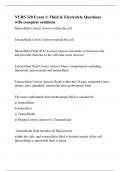
-
NURS 320 Exam 1: Fluid & Electrolyte Questions with complete solutions
- Exam (elaborations) • 5 pages • 2024
-
- $16.99
- + learn more
Intracellular Correct Answer-within the cell Extracellular Correct Answer-outside the cell Intercellular Fluid (ICF) Correct Answer-surrounds/ in between cells and provides nutrients to the cells and waste removal Extracellular fluid Correct Answer-Many compartments including: Interstitial, intravascular and transcellular Transcellular Correct Answer-fluids within the GI tract, respiratory tract, urinary tract, glandular, intraocular and cerebrospinal fluid The nurse understands t...
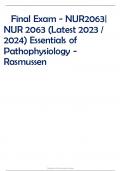
-
Final Exam - NUR2063| NUR 2063 (Latest 2023 / 2024) Essentials of Pathophysiology - Rasmussen
- Exam (elaborations) • 24 pages • 2024
-
- $16.49
- 1x sold
- + learn more
Distribution of this document is illegal Final Exam - NUR2063| NUR 2063 (Latest 2023 / 2024) Essentials of Pathophysiology - Rasmussen S - The Marketplace to Buy and Sell your Study 1. Which of the following assessmentfindingsindicates analteration in homeostatic control mechanisms? - Fever 2. Injury that occurs when blood flow is diminished to tissue is called injury. - ischemic 3. The cancer growth continuum is divided into which of the following stages? - Initiation, promotion, ...
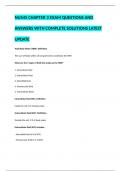
-
NU545 CHAPTER 3 EXAM QUESTIONS AND ANSWERS WITH COMPLETE SOLUTIONS LATEST UPDATE
- Exam (elaborations) • 24 pages • 2024
-
Available in package deal
-
- $9.99
- + learn more
NU545 CHAPTER 3 EXAM QUESTIONS AND ANSWERS WITH COMPLETE SOLUTIONS LATEST UPDATE Total Body Water (TBW): Definition The sum of fluids within all compartments constitutes the TBW What are the 5 types of fluid that make up the TBW? 1. Intracellular fluid 2. Extracellular fluid 3. Interstitial fluid 4. Intravascular fluid 5. Transcellular fluids Intracellular fluid (ICF): Definition Inside the cell, 2/3 of body water Extracellular fluid (ECF): Definition Outside the cell, 1/3 of body wa...
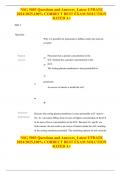
-
NSG 5003 Questions and Answers_Latest UPDATE 2024/2025,100% CORRECT BEST EXAM SOLUTION RATED A+
- Exam (elaborations) • 121 pages • 2024
-
- $14.49
- + learn more
Quiz 1 Question : Why is it possible for potassium to diffuse easily into and out of cells? Student Answer: Potassium has a greater concentration in the ICF. Sodium has a greater concentration in the ECF. The resting plasma membrane is more permeable to potassium. An excess of anions is inside the cell. Instructor Explanation: Because the resting plasma membrane is more permeable to K+ than to Na+, K+ can easily diffus...

-
TEST BANK PATHOPHYSIOLOGY THE BIOLOGICAL BASIS FOR DISEASE IN ADULTS AND CHILDREN BY McCance
- Exam (elaborations) • 493 pages • 2023
- Available in package deal
-
- $6.69
- 4x sold
- + learn more
TEST BANK PATHOPHYSIOLOGY THE BIOLOGICAL BASIS FOR DISEASE IN ADULTS AND CHILDREN BY McCance Chapter 1: Cellular Biology MULTIPLE CHOICE 1. Which statement best describes the cellular function of metabolic absorption? a. Cells can produce proteins. c. Cells can take in and use nutrients. b. Cells can secrete digestive enzymes. d. Cells can synthesize fats. ANS: C In metabolic absorption, all cells take in and use nutrients and other substances from their surroundings. The remaini...

Do you wonder why so many students wear nice clothes, have money to spare and enjoy tons of free time? Well, they sell on Stuvia! Imagine your study notes being downloaded a dozen times for $15 each. Every. Single. Day. Discover all about earning on Stuvia


